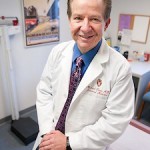Tag School of Medicine and Public Health
Lead exposure dooms some Wisconsin kids to struggle in school
Two studies funded by the Wisconsin Partnership Program paint a grim reality for Wisconsin children exposed to lead before age 3. Read More
Essential mechanism of symbiosis found in Hawaiian squid
Experiments at the University of Wisconsin–Madison with a small squid that glows in the dark have uncovered a complex conversation that allows the newly hatched squid to attract the glowing, symbiotic bacteria that disguises it against predators. Read More







